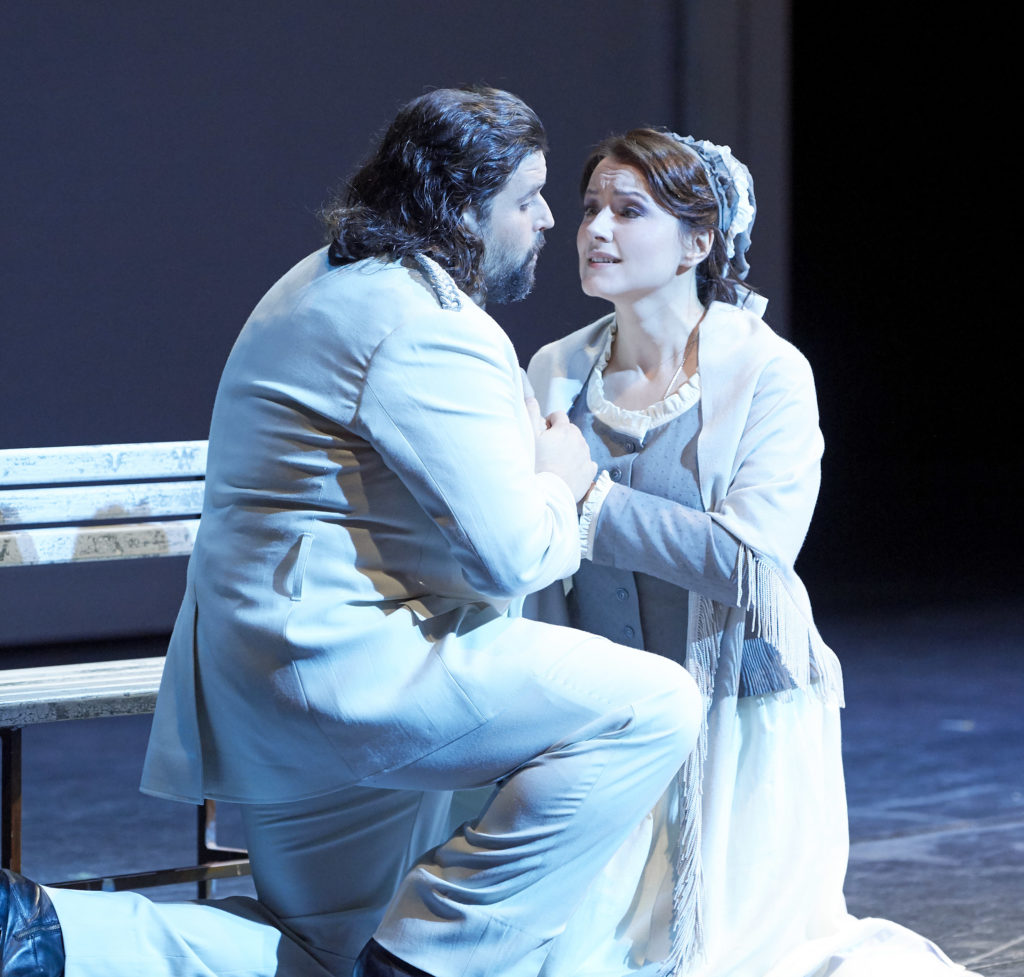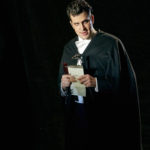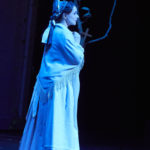 Gounod’s opera Faust spends less time with Faust’s struggle with his conscience and the Devil, than with his love affair with Marguerite. The real conflict is that of Marguerite , who fights in the central Acts right to the end against her love for Faust and for her religious faith. (Fortunately, with Anita Hartig we cannot get enough of Marguerite.) Gounod makes of Goethe’s tragedy an opera in the French 19th century Romantic tradition: And that (for us) Victorian era was obsessed with (Christian) religion and ‘Christian’ values and ceremony, as in Gounod. Tough for us non-believers , but Gounod is full of good tunes, spectacle, and romantic drama. Vienna State Opera’s Nicholas Joel production, a minimalist staging (Andreas Reinhardt) with mainly grey panels, is functional, the overall scheme grey/black /white inoffensive, and sensibly the costumes are period late 19th century.
Gounod’s opera Faust spends less time with Faust’s struggle with his conscience and the Devil, than with his love affair with Marguerite. The real conflict is that of Marguerite , who fights in the central Acts right to the end against her love for Faust and for her religious faith. (Fortunately, with Anita Hartig we cannot get enough of Marguerite.) Gounod makes of Goethe’s tragedy an opera in the French 19th century Romantic tradition: And that (for us) Victorian era was obsessed with (Christian) religion and ‘Christian’ values and ceremony, as in Gounod. Tough for us non-believers , but Gounod is full of good tunes, spectacle, and romantic drama. Vienna State Opera’s Nicholas Joel production, a minimalist staging (Andreas Reinhardt) with mainly grey panels, is functional, the overall scheme grey/black /white inoffensive, and sensibly the costumes are period late 19th century.
Rien; nothing to live for. Jean-François Borras’ Faust, white-bearded, in a dark coat and skull cap, is an old man huddled side of stage. Borras’ lyrical tenor is rich and sensuous, sung with fervour. He curses everything, yearning for death: about to take poison, but distracted by the sound of birdsong and children praying. Again he curses human life that deceives with false hope. And in despair calls on Satan. Oh, dear! Mephistopheles (Méphistophélès) immediately takes the call.
 Luca Pisaroni appears in a slick top hat and tails, and cloaked. The tall Chilean, he looked pretty good to me! Pisaroni has a deep bass, but he’s not too serious, rather mischievous. What can you do for me? Everything. But what do you want? Not fame. Youth, the treasure that encompasses all . Mephistopheles entraps Faust, conjuring up a vision of Marguerite. Faust signs the pact, Pisaroni triumphantly waving the paper: down there he will be mine. Borras is transformed , dressed now in white, his long hair lustrous and black, but still rather corpulent.
Luca Pisaroni appears in a slick top hat and tails, and cloaked. The tall Chilean, he looked pretty good to me! Pisaroni has a deep bass, but he’s not too serious, rather mischievous. What can you do for me? Everything. But what do you want? Not fame. Youth, the treasure that encompasses all . Mephistopheles entraps Faust, conjuring up a vision of Marguerite. Faust signs the pact, Pisaroni triumphantly waving the paper: down there he will be mine. Borras is transformed , dressed now in white, his long hair lustrous and black, but still rather corpulent.
The struggle is over in one Act, all too quickly. In Marlow, Dr. Faustus seeks the secrets of the universe, as does Goethe’s academic: both in torment with their conscience. But Gounod’s Faust is a blank, (a hermit, tramp-like figure in this production): uncharacterised, we know nothing about him, just that he’s let himself go.
Act 2, by contrast, is all spectacle, excellently staged, barrels lined up outside a brewery, a 19th century street scene, men in suits in a tug of war, symbolising the struggle between good and evil; soldiers going to war, Valentin (Orhan Yildiz) leaving his sister Marguerite unprotected. Mephistopheles rabble-rouses the crowd with a song (Le Veau d’or) about the golden calf and extolling the power of money. And Satan leads the dance! He’s abusive to Siebel, Marguerite’s suitor (Rachel Frenkel in a trouser role); and challenges Valentin (Yildiz) , let’s see if the cross can save you from hell! There’s a waltz set piece, and altogether a tableau of conventional bourgeois (second Empire) French life.
Faust, waiting tentatively outside Marguerite’s idyllic cottage, is as if captivated by the pastoral scene, his voice ringing with purity, in a God-like ecstasy, while Pisaroni waits in the wings. What trepidation siezes him, but what angelic splendour, Salut, demeure chaste et pure, sings Borras; nature, which gives shelter to his suffering soul, has transformed this woman into an angel. Borras’ tenor has tremendous power in the climaxes, although (my Viennese neighbour noted) he was twice shaky in his high notes.
Anita Hartig is ideally cast as Marguerite, her classically pure, yet powerful soprano stripped of any artifice. She sings a tale of a goblet, and of two people in love. Despite herself, she can’t help falling for Faust. It makes her glad to see him, she sings, gliding to her top notes.
But she’s manipulated by the ubiquitous Mephistopheles, who leaves a casket of jewellery to tempt her. So their next meeting takes place in Marguerite’s garden, allowing Faust to walk with her, while Pisaroni distracts her neighbour, the chaperone, Pisaroni so charming, his baritone is almost too unctuous.
Hartig’s Marguerite sings about her mother: if heaven made her like you, then she would have been an angel, sings Borras. (In spite of his tailored tunic jacket, his long hair makes him look like an oaf: not at all professorial, more like a student.)
In their duet, Marguerite, affected by Faust’s declaration, at first turns down his offer to spend the night with her. She pleads with him not to break her heart. If he loves her, he will go. In their duet, he embraces her, Laisse-moi contempler ton visage. Accepting that he loves her, her heart is in turmoil. But she tenderly calls him back.
In the plot, Marguerite has given birth to Faust’s child, and is ostracised. In Act 4, where Marguerite is in a cloister praying, we see the pipes of an organ, but beneath a red glow, like an infernal oven. As she kneels to God, Mephistopheles, aside, sings ominously, you shall not pray. Pisaroni is now in a red silk shirt, and black leather coat, blocking her access. You sing chaste prayers in a childish voice, your remorse unending.  She asks, who is the voice threatening her. He, no God any longer has need of you. There’s no hope. The conflicting voices chillingly encapsulate the struggle of faith against darker forces. Pisaroni kneels mimicking her prayers. He then stands behind her like a fearsome spectre. The organ fades. Very effective.
She asks, who is the voice threatening her. He, no God any longer has need of you. There’s no hope. The conflicting voices chillingly encapsulate the struggle of faith against darker forces. Pisaroni kneels mimicking her prayers. He then stands behind her like a fearsome spectre. The organ fades. Very effective.
Gounod’s jaunty Soldier’s Chorus, as soldiers line the front of stage – trumpets, the brass blazing , tubas belching. Valentin prays for his sister. The slightly- built Yildiz is no match against the towering Pisaroni in his diabolical red and black outfit. A pretty nasty killing, Pisaroni, as if he’s wielding a sword, using his dark arts.
A drum roll, a fanfare of trumpets, trombones – at last, red-blooded Gounod. The devil has all the best tunes, they say. A cage, a metal grill with a figure in white tied up like some dog. Do not delay: they’re building the scaffold. Her despair (Marguerite’s) has robbed her of her senses, Chorus sing. His, Borras’ call, revives her heart, Hartig’s resuscitation quite convincing. Now chains will not hold him back. Viens! But she won’t go with him. She recognises the devil in the shadows. There’s a tug of war- in Joel’s production symbolising the pull between good and evil- with Hartig’s Marguerite left, Borras center, then Pisaroni’s devil. But she puts her faith in the God of justice. The hour has stricken. Why are his hands so bloodless?! Hartig is centre stage -radiant with a religious vision: Anges pur! Anges radieux! The stage is alight. Christ has risen, she sings.
Thus Gounod (and librettists Jules Barbier and Michel Carré) have shifted the focus onto Marguerite, and her affirmation of faith. And Faust is side-lined in promoting the Christian message over man’s angst-ridden existential crisis.
Borras, a little disappointing after hearing Piotr Beczala as Faust here in 2009; Hartig was peerless; Pisaroni not quite evil enough. Simone Young, conducting Vienna State Opera Orchestra, Chorus and extra choirs, was the other heroine of the evening.© P.R. 25.3.2017
Photos: Jean-François Borras (Faust) and Anita Hartig (Marguerite); Luca Pisaroni (Méphistophélès); Anita Hartig (Marguerite)
© Wiener Staatsoper / Michael Pöhn
